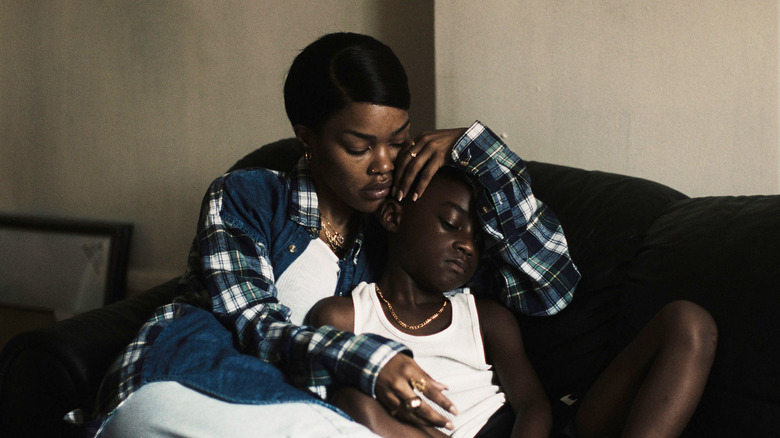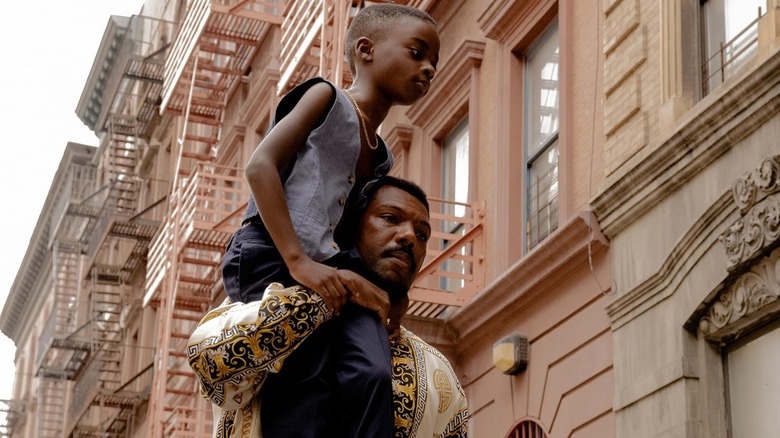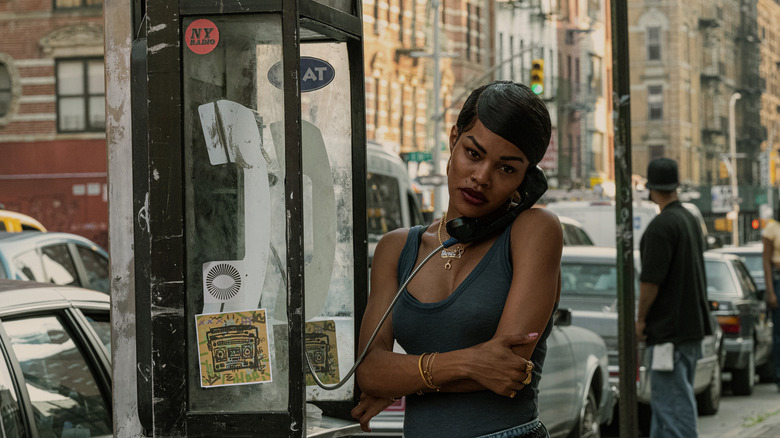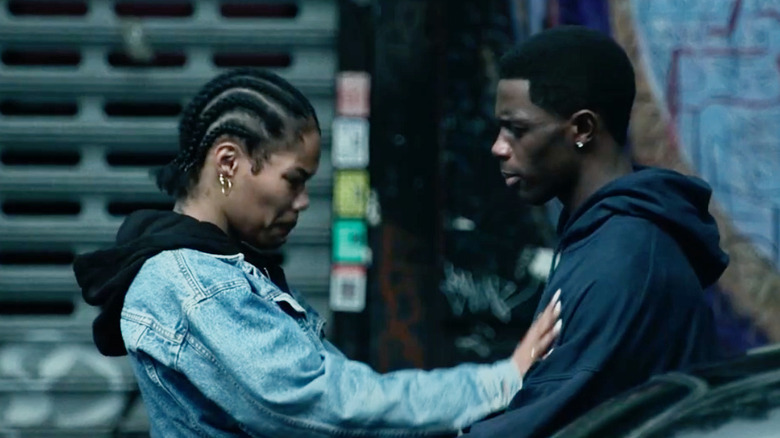A Thousand And One Ending Explained: Family Is What You Make It
A.V. Rockwell's powerful feature writing/directing debut "A Thousand and One" is as much a story about Harlem as it is one about a mother raising her son there. The film takes place from the early 1990s through to the mid-2000s, a period in which the predominantly Black district is subjugated by the policies of New York City Mayors Rudy Giuliani and Michael Bloomberg. As Harlem becomes increasingly gentrified, many of its local Black-owned businesses and mom-and-pop operations gradually go under. Meanwhile, affordable housing for its working-class citizens becomes a thing of the past, even as they're subjected to stricter jaywalking laws and the New York City Police Department's racist stop-and-frisk practice.
To create this profound cinematic portrait of Harlem's history, Rockwell combines real audio snippets of Giuliani and Bloomberg pitching their vision for NYC (one that's more affluent and white, as they state in thinly coded language) with a fictional narrative and footage of the city being gentrified in real-time in the wake of the 2020 lockdowns. "If you thought gentrification was going crazy [during the film's timeline], it went on steroids over the pandemic," Rockwell noted during an interview with her fellow writer/director Chinonye Chukwu ("Till") for Filmmaker Magazine. The resulting film is as ambitious as features by first-time directors go — one that's akin to Roberto Rossellini's Italian neorealist classic "Rome, Open City" in the way that it merges an authentic melodrama with a documentary-like snapshot of a specific time and place.
However, for everything "A Thousand and One" aspires to say and do, it never loses track of the human element at its core: a tale about people struggling to make a life for themselves and their chosen family.
What you need to remember about the plot of A Thousand and One
Teyana Taylor stars in "A Thousand and One" as Inez de la Paz, a 22-year-old hairdresser who's fresh out of Rikers when she decides to, basically, kidnap her six-year-old son Terry (Aaron Kingsley Adetola) rather than allowing him to suffer further neglect and trauma from NYC's under-funded and over-stretched foster care system (which Inez herself was raised in). In order to protect Terry from the members of the NYPD who are now looking for him, Inez provides him with a fake birth certificate and social security card that will allow him to safely enroll in school.
In truth, of course, the authorities aren't really invested in finding a young Black boy like Terry (a damning condemnation of the NYPD's priorities in and of itself), making it easier for him and Inez to fly beneath the radar. Despite having few resources and only a handful of friends for support, Inez eventually lands steady employment while securing an apartment for her and Terry to live in. This is also where we learn the double meaning of the film's title; as much as "A Thousand and One" refers to the never-ending obstacles Inez must overcome in her efforts to care for Terry, it is also their apartment's literal address (which is missing a dash).
As the years pass, Inez and Terry form a family with Inez's boyfriend-turned-husband Lucky (Will Catlett). Over time, though, their relationship is hurt by Lucky constantly cheating on Inez and periodically abandoning her and the now 13-year-old Terry (Aven Courtney) without explanation. Exterior forces in the form of Inez's predatory landlord, who not-so-subtly conspires to drive them out of their apartment by allowing it to fall into disarray, further threaten the stability the three have achieved.
What happened at the end of A Thousand and One
By the time Terry turns 17 (now played by Josiah Cross), much has and hasn't changed. Terry has now spent years studying at a specialized STEM school, Lucky has died from cancer, and their landlord is taking increasingly aggressive measures to get them out of their home so it can be rebuilt and sold at a higher value. As he begins planning for his immediate future, Terry hands his personal documents over to his guidance counselor, unaware that they're forged. With the cat finally out of the bag, he quickly tells Inez what happened, giving her a chance to flee before the authorities arrest her.
It's only then that Terry discovers the shocking truth. Upon being taken in by social services, he is informed that Inez is not his biological mother. Inez confirms this when Terry breaks out of his foster home — much like he did when he was a child, right before Inez got out of prison — and confronts her. She also confesses that his oldest memory was not of her leaving him on a street corner before she went to prison like he believed, but of his biological mother abandoning him there. Being a foster kid, it wasn't hard for Inez to see herself in him the first time she laid eyes on Terry, which is why she decided then and there to raise him as her own son.
Obviously, after everything they've gone through together (we'll dig into that in a moment), this revelation does nothing to change how Inez and Terry feel about one another. The film then ends with them parting ways but assuring one another they will see each other again someday.
What the end of A Thousand and One means
Part of what makes the political commentary in "A Thousand and One" so impactful is that it's rooted in the personal experiences of the film's characters. Rather than focusing on the figures of authority responsible for maintaining NYC's broken social support systems or implementing the legislature that upholds white supremacy (again, the likes of Giuliani are heard but not seen), we're constantly shown what daily life is like for Black people such as Inez, Lucky, and Terry in this environment. This also frees up the film to hit upon its core theme of found family and how the family we choose can be more important than the ones we're born with.
The importance of empathy and compassion is also a motif "A Thousand and One" continually returns to in order to reinforce this idea. Inez has no practical reason to care for Terry as her own; it's her ability to relate to his situation, coupled with her innate kindness, that propels her to do so. Similarly, when things go sour between him and Inez, Lucky still does his best to be there for Terry like a father, choosing to care for him simply because he can. After Lucky's death, Inez even has Terry invite a woman Lucky cheated on her with (and ended up having a child with) to his funeral like she would a member of their family, realizing there's no point in being needlessly cruel to her.
By the time he learns the truth, Terry is old enough to not only understand why Inez did what she did but also to properly choose her as his mother. Or, to put a maternal spin on Yondu's famous tear-jerking line from "Guardians of the Galaxy Vol. 2," Inez might not be Terry's mother but she's unquestionably his momma.
What has A.V. Rockwell said about the ending?
"I wanted to tell a story about a family versus the city," Rockwell explained to Chukwu. "I was trying to understand what happened to New York City as I knew it, and what was happening to communities of colors that felt targeted — trying to tell that story but also parallel it against what my experiences have been or experiences other Black women have [had] coming of age in this environment."
She added, "What people that see the film understand by the end is that this was a story about a Black woman who was desperate to be loved, not just needed." This is also what inspired her to juxtapose Inez's and Terry's stories with the gentrification of NYC. "How do I feel about a city that I love so deeply, but it seems like it doesn't really love me?" said Rockwell.
The final result is invigorating if narratively bumpy, as Terry's coming-of-age journey doesn't have quite enough room to breathe compared to the film's other threads. Nevertheless, "A Thousand and One" makes for a moving examination of Black kinship — especially womanhood — that depicts the erasure of Harlem's historic cultural identity to incriminating effect. At the same time, the film avoids reducing its characters to pure victims of circumstances and often takes the time to highlight their personal failings (be it Lucky's difficulties with commitment or Inez's impatience), which affords them greater humanity.
To let Rockwell put it in her own words, "A Thousand and One" is about "how hard it is to keep Black families together, and the different things that try to rip us apart — not only external factors but also internal dynamics within the family that make it hard for us to overcome what society throws at us."




